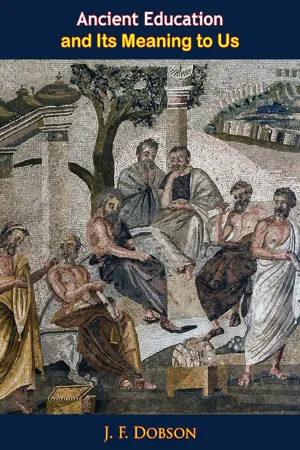
- 127 pages
- English
- ePUB (mobile friendly)
- Available on iOS & Android
Ancient Education and Its Meaning to Us
About this book
WHAT is the true object of education? Should the educator aim at training the largest possible number of individuals to be of the greatest possible service to the State, up to the limit of the capability of each, or should he rather try to give each one an opportunity to develop fully the best qualities which he possesses, regardless of whether this method of training may or may not seem to be of immediate practical use either to the person or to the community? The question, in most ages and most countries, does not admit of a simple answer. It came nearest to being answered in Sparta, which of all nations known to history paid least attention to the individual as such, and in Republican Rome, which, though not so rigid as Sparta, regarded education as concerned mainly with the production of useful citizens. In Rome, at least before the great development which followed on the introduction of Greek ideas, and in Sparta throughout her history, this social side of education was predominant.In other Greek states there was at all times more of individualism. The Ionians of Asia Minor represent the extreme of the opposite attitude, and even democratic Athens did not wish to have all her citizens turned out of the same mould, but, while giving equal opportunities to all, neither expected nor wished that everyone should follow the same line or reach the same goal... Plato, for instance, who was deeply influenced by Spartan ideals, attached the highest importance to the State, and though, in his Republic, he would have the individuals highly trained in many branches of learning which in Sparta or early Rome would have been rejected as either superfluous or harmful, it has been often pointed out that the individuals in his State pass a laborious life of service and self-sacrifice in order to assure the greatest happiness to the greatest number; while his strictures on poetry and other imitative arts shew further that the individual is to him of little importance.
Frequently asked questions
- Essential is ideal for learners and professionals who enjoy exploring a wide range of subjects. Access the Essential Library with 800,000+ trusted titles and best-sellers across business, personal growth, and the humanities. Includes unlimited reading time and Standard Read Aloud voice.
- Complete: Perfect for advanced learners and researchers needing full, unrestricted access. Unlock 1.4M+ books across hundreds of subjects, including academic and specialized titles. The Complete Plan also includes advanced features like Premium Read Aloud and Research Assistant.
Please note we cannot support devices running on iOS 13 and Android 7 or earlier. Learn more about using the app.
Information
Table of contents
- Title page
- TABLE OF CONTENTS
- INTRODUCTION
- I. SPARTA
- II. ATHENS
- III. GREEK THEORY
- IV. ROME
- V. ROMAN THEORY
- VI. THE EMPIRE
- VII. THE MIDDLE AGES AND AFTER
- VIII. CONCLUSION
- SELECT BIBLIOGRAPHY OF THE CHIEF AUTHORITIES CONSULTED
- Our Debt to Greece and Rome